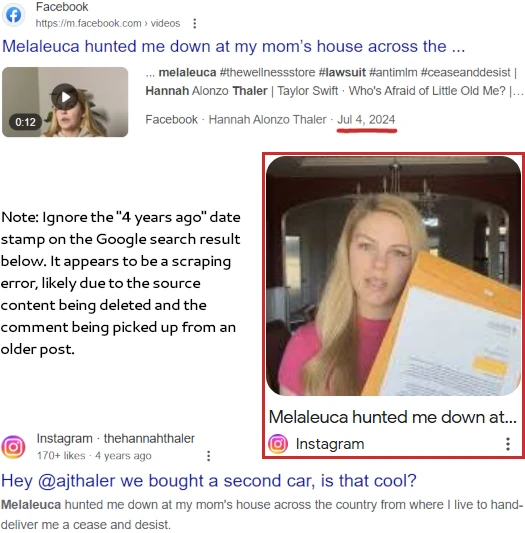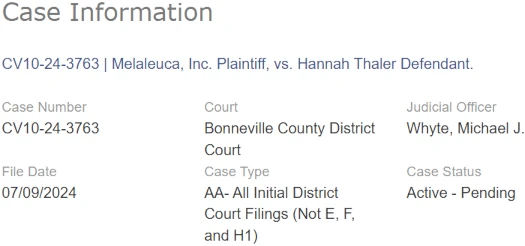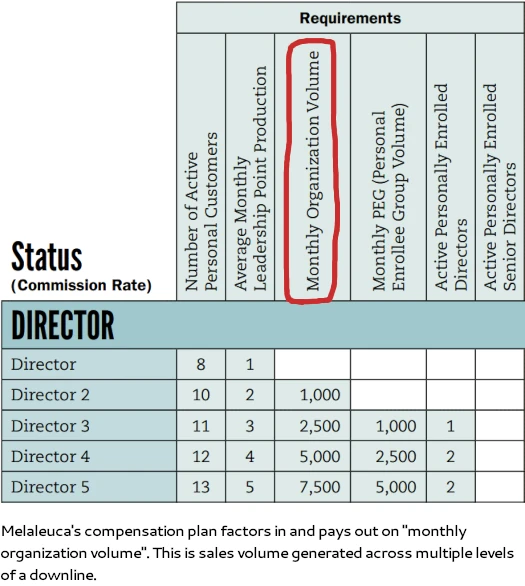Melaleuca lawsuit prompts YouTube correction video
 Legal action by Melaleuca has prompted a YouTube apology video from Hannah Lee Thaler.
Legal action by Melaleuca has prompted a YouTube apology video from Hannah Lee Thaler.
Thaler runs the YouTube channel “Hannah Alonzo” which, as of September 2024, boasts 475,000 subscribers.

On or around July 4th, Thaler revealed Melaleuca had sent her a cease and desist.

I’m assuming this means Melaleuca sent the notice around late June.
Unfortunately Thaler’s content around receiving the cease and desist has been deleted, so I can’t comment on specifics of what was said. Judging from the screenshots above though, which are still archived in Google search, Thaler wasn’t impressed.
Thaler going public with Melaleuca’s cease and desist (and assumed non-compliance), appears to have prompted Melaleuca to file a lawsuit.
Melaleuca filed suit against Thaler in Idaho on July 9th, 2024.

Unfortunately Idaho does not provide public access to case documents (I don’t believe you can access them online, only the docket), so I haven’t seen Melaleuca’s filed complaint.
As per the case docket, Melaleuca served Thaler sometime between July 9th and July 11th. A set of discovery requests was served on Thaler on July 18th.
As of September 16th, the case docket reflects the outcome of Melaleuca’s lawsuit is pending.
On September 14th however, Thaler uploaded a video to the Hannah Alonzo channel titled “Correcting the Record on Melaleuca”.

In the [1:45] video, Thaler states;
A few weeks ago on June 24th I made a video about two independent contractor marketing executives from Melaleuca who contacted me asking to sponsor me.
I thought that their request was strange.
In my video I was critical of Melaleuca’s business model, and I suggested that I did not consider Melaleuca to be a legitimate company. And I said that I considered them to be a multilevel marketing company, even though they insist they are not.
The company reached out to me and asked me to correct those statements. The company also asked me to spend some time learning more about them and I’ve had several meeting with them.
I was wrong about the company.
And I don’t intend this to be an out and out endorsement of Melaleuca, because I don’t do that. But I am convinced that Melaleuca is not like any MLM company that I’ve ever dealt with.
Clearly I was definitely wrong to say they are not a legitimate company.
I spent some time with the company’s founder and Executive Chairman, Frank Vandersloot and his wife Belinda. And I also did some extensive homework on my own.
I learned that they [Melaleuca] are one of the largest employers in the state of Idaho. Forbes magazine ranks them [as] one of the best employers in America. And the Better Business Bureau has given them several awards for ethics and business operations.
They are considerably different than most MLMs.
In regard to whether they fit the legal definition of being a multi-level marketing company. I believe that’s still debatable, because of the many legal and informal definitions of the term multi-level marketing.
But clearly they have a valid argument to suggest that they do not fall under the definition of being an MLM. They are certainly different than any multi-level marketing I’ve dealt with.
I was surprised to learn they have spent the last thirty years being critical of multi-level marketing companies, for all the damage MLM does to people’s lives.
In regard to the two marketing executives that contacted me, asking me to sponsor them, Melaleuca informed me that they were acting against the company’s policies, and that they have been sanctioned for their actions.
I am making these corrections because I want to be accurate and I want to be fair to Melaleuca and its marketing executives.
At time of publication Thaler’s video has 41,000 views. Comments on the video are disabled.
The general consensus of hundreds of comments discussing the video on the antiMLM subreddit is that the video wasn’t genuine.
Addressing these concerns, Thaler added this to the correction video’s description;
In response to comments that this video about Melaleuca was not sincere, I assure you that it was and it was truthful.
Melaleuca reached out to me and asked me to learn more about the company. I spent many hours with the management of the company and did in fact learn more about it which gave me the comfort level to post the video I did.
After learning more about the company, I felt I should make a correction to what I had previously said about the company.
Everything that I said in this video about them is truthful. I am moving forward and turning my attention to topics that continue to interest me and hopefully you too.
BehindMLM reviewed Melaleuca in January 2019. Having glanced over a more recent copy of Melaleuca’s compensation plan, not much has changed.
That said, sliding retail commission rates to 20% over 7% in 2019 is a significant improvement.
Having refreshed my memory on Melaleuca, both from our published review and a more recent copy of its compensation plan, I believe I can weigh in on the two key points that appear to have prompted Melaleuca’s lawsuit.
The first is whether Melaleuca is an MLM company. It absolutely was in 2019 and absolutely is in 2024.
I’m not stating that within the context of any negative connotations Melaleuca might harbor towards MLM, I’m stating it as as a matter of fact based on Melaleuca’s compensation plan.
Before we get into that though, let’s examine Melaleuca’s claims about not being an MLM.
Here’s Melaleuca’s position, in their own words as published in Idaho Falls Magazine in 2014.
When differentiating Melaleuca from MLM definitions and companies, Melaleuca CEO Frank VanderSloot says Melaleuca simply does not have multiple levels of distribution.
Melaleuca does not have “distributors” and its marketing executives are not salespeople. The role of the marketing executive is to refer customers to Melaleuca, help them set up shopping accounts and then train others to do so.
Essentially, they don’t peddle products like MLM distributors.
VanderSloot backs up this point by showing Melaleuca’s policies actually prohibit marketing executives from selling products directly to others. Because all customers order directly from Melaleuca, the point of sale happens directly between the customer and the company (and not from a salesperson or distributor).
This point is a fundamental element in demonstrating how Melaleuca does not meet MLM definitions.
Additionally, VanderSloot says that “typical MLM companies are designed to attract people to ‘invest’ in inventories of product with the promise of getting rich quickly by getting others to invest.
In Melaleuca’s case, there is no investment and no getting others to invest.”
Instead of hoping for a quick win by getting customers to make large upfront investments, Melaleuca has sought to develop long-term customers.
So far, it seems as if that strategy is working: Melaleuca has a 95 percent month-to-month reorder rate. And since there is no investment, no one has ever claimed they lost their investment.
I’ll address these points in a moment.
Since inception, BehindMLM has classified an MLM company as such if it utilizes an MLM compensation plan. Beyond that an MLM company can use whatever terminology it wants (including “we are not MLM” rhetoric), but if said company uses an MLM compensation plan we will classify it as an MLM company.
The specific thing to look for in a compensation plan is payment on volume across multiple levels. This can be commissions or a bonus – so long as volume is tracked and paid out over more than one level it is, by definition, multi-level.
The use of multiple levels in a compensation plan also brings with it uplines and downline, foundations of any MLM business model.
With respect to Melaleuca’s compensation plan:
- Melaleuca affiliate ranks are tied to “monthly organization volume” (GV, which is generated downline sales volume across multiple levels)
- retail commissions are paid on retail volume generated on up to seven levels of downline recruitment
- “organization commissions” are paid as a percentage of sales volume generated by directly and indirectly recruited downline affiliates
- Melaleuca bonuses require and are paid on sales volume generated by non-personally recruited downline affiliates (e.g. Core Mentoring Bonus)
Like I said, based on Melaleuca using an MLM compensation plan Melaleuca is absolutely an MLM company.

Melaleuca’s arguments that it doesn’t have distributors or that its affiliates don’t resell products are unavailing. Neither changes Melaleuca’s multi-level marketing compensation plan, that pays commissions and bonuses across multiple levels.
At best Melaleuca could argue it is an MLM company with a “no resale” prohibition clause.
Is that worthy of an entire business model reclassification? Probably not.
It’s a bit like a toothpaste company putting the nozzle at the bottom of its tubes and demanding people stop calling it a toothpaste company.
“Guys, we put the nozzle on the BOTTOM of the tube. We’re not a toothpaste company like the rest of those “nozzle on the top” scumbags!”
Editor’s note: To the Melaleuca attorney(s) reading this and potentially thinking about sending BehindMLM a cease and desist, the above is a joke based on Thaler stating;
I was surprised to learn they have spent the last thirty years being critical of multi-level marketing companies, for all the damage MLM does to people’s lives.
By all means make the distinction Melaleuca doesn’t allow resale of its products if you want to. That’s doesn’t change Melaleuca’s use of an MLM business model and compensation plan. It’s an MLM company.
As to legitimacy, in reviewing Melaleuca I originally felt the distinction between its retail customers and distributors was adequate.
Post-publication however, a reader pointed out Melaleuca classifies their affiliates as “customers”. In MLM, a “customer” isn’t necessarily the same as a “retail customer”.
This prompted a rethink and slight editing of the originally published review.
Basically what the legitimacy of Melaleuca as an MLM comes down to is whether, company-wide, revenue is primarily generated from sales to retail customers.
And just so we’re clear, a retail customer in MLM is someone who signed up as a customer and has no access to the business opportunity.
This means that no matter what the retail customer does in an MLM company, they cannot and will not ever qualify to earn commissions and/or financial bonuses of any kind (product credits or free product are excluded).
As has been established twice in court in the FTC v. Vemma and FTC v. Herbalife cases, participants who have signed up for an MLM opportunity that can’t/don’t recruit and/or haven’t earned any commissions are not retail customers. They are participants in the MLM opportunity.
This is from Melaleuca’s compensation plan;
To qualify for commissions, a Marketing Executive is required to “personally produce” revenue of at least 29 Product Points per month.
That simply means you must designate various households who will be designated to purchase on your Personal Production Account.
You can allow anyone to use this account to purchase their Melaleuca products.
Many Marketing Executives use this account to purchase products for their own household.
Whether a Melaleuca affiliate’s “personal production account” is counted as a Melaleuca customer (no retail distinction) isn’t specified.
Whether 100% of Melaleuca’s claimed customers have access to its income opportunity was unclear in 2019. It remains unclear today.
The quick fix to this is Melaleuca being clearer about retail customers in its compensation documentation, but I digress.
When I come across uncertainty like this in an MLM compensation plan, I avoid using definitive terms (e.g. “illegitimate”).
The fact of the matter is without further clarification, consumers are left unable to make an informed decision about the MLM company in question. The onus is on the MLM company to provide that clarification (as I have done above with Melaleuca), and it’s perfectly acceptable to point this out.
Where Thaler might have erred is in using definitive terms like “illegitimate”where, pending clarification, uncertainty in the information disclosed prohibits a definitive assessment.
I know that’s a long winded way of explaining the concept but as a reviewer, be it on a website one ones or on YouTube, publishers have responsibility for the statements they make.
I haven’t seen the video in question because it’s been deleted, but I imagine Thaler didn’t explain why she came to the conclusion Melaleuca was “illegitimate”.
I expect at some point Melaleuca’s Idaho case docket will reflect a reached settlement between the two parties. I’ll leave an update below if that happens.
Update 20th September 2024 – Melaleuca filed a Stipulation to Dismiss with prejudice on September 19th. This brings Melaleuca’s case against Hannah Thaler to an end.


A well-argued analysis supporting the view that Melaleuca is an MLM, despite years of them claiming otherwise.
Oh, and they even put out a document entitled “Drawing the Line” with lots of Melaleuca political friends claiming that they too have concluded that Melaleuca is not an MLM.
If their independent contractors are not salespeople then why do they need them? Why not just operate a pure buying club?
While I commend Melaleuca for being a good employer (and with their product margins, why not), it does not change how they generate revenue.
And not even just that, their commissions span multiple tiers – where the M in (M)LM comes from.
I have yet to read an explanation of how Melaleuca benefits from insisting they are NOT an MLM.
Who wants to be a commission-only contractor who pays to participate in a compensation plan and receives benefits not related to the direct sale of the product… as long as it doesn’t call itself an MLM?
Hannah Alonzo is a high quality anti MLM content creator and I can’t recommend her youtube channel enough.
I greatly hope her legal situation gets resolved to her satisfaction.
Hypothetically if Melaleuca had more affiliate customers than true retail customers, they might argue in court that is doesn’t matter because “we’re not MLM”.
Other than wanting to differentiate itself from whatever comes with being associated with the MLM industry, there doesn’t appear to be any business advantage.
“but I imagine Thaler didn’t explain why she came to the conclusion Melaleuca was “illegitimate”.”
Since I’m commenting with my opinion, and I’m not the owner of this website, nor am I making public videos, I’ll explain why:
Melaleuca is an MLM company. MLM inherently defaults to the endless-chain recruiting of new and existing participants ordering products, not selling them. This is otherwise known as a product-based pyramid scheme. Hence, the use of the word “illegitimate”.
If Melaleuca doesn’t want to be known as an MLM company, stop using the MLM system.
Their excuse that the person orders direct is now the standard in MLM, especially since the invention of….wait for it….the internet. Even Amway, the MLM mothership, has been touting for years “Buy from yourself, and teach others to do the same”. An affiliate will “order direct” and find others who “order direct” from the Amway website.
Reselling products, or the lack thereof, is insignificant for the MLM system to operate. People do not need to resell already ordered products to make an MLM commission. Banning that practice is immaterial.
As Oz already pointed out, it is not “do you” or “have you” made a commission, but “can you” make a commission, and on multiple levels.
This is also quite interesting: “A different problem emerged in 1998. When sales flattened, VanderSloot did some digging and discovered that some senior directors were living off their residuals and doing little in the way of recruitment. Result: a new policy that reduced payments to those who didn’t either bring in new converts or help others do so. Since then, company revenues have grown at a compound annual rate of 12%.”
forbes.com/forbes/2004/1011/089.html
Melaleuca plan pays in a 4 by 7 matrix, it means, 4 front people and seven levels… LEVELS. If walks like a duck…
Looked like a unilevel to me. No limit on first level.
Marketing Executives in Mel. only approx 18% are building a business. 82% are customers that purchase on a monthly basis.
The majority have no interest in building the business. I joined Mel around 2009 as a Marketing EX. Tried to build a biz made it to Director.
I eventually quit because it was difficult competing against sites like BehindMLM & other anti-MLM sites that cause people to quit.
Yet here I am a happy customer of Mel that has purchased on & off since 2009. Only about 2 yr’s ago now I decided to become active again as a Marketing EX. It’s not the money … but the enjoyment of the products and the possibility of helping others and yes the money! 🙂
I mean who doesn’t like popcorn, chocolate and now Prime Beef? My current enroller is a multi-million dollar earned.
Let me ask BehindMLM this … since you believe earning commissions on many levels makes a company MLM … Is Keller Williams Realty, EXIT Realty or EXP Realty are they all multilevel companies too?
Yes they allow recruitment of agents under agents across states. They pay commissions on many levels from the sale of homes.
This MLM, NOT MLM is bogus … what should be the issue is the company providing quality products. How long has the company been in business? For Melaleuca now 35 yr’s.
Mel & many other companies have proven their worth over & over again by longevity, quality of products, global participants & FTC scrutinization for decades.
(Ozedit: derails removed)
Melaleuca’s Marketing Executives aren’t retail customers though, and as far as the FTC is concerned that’s a problem.
FTC: MLM companies with little to no retail activity are illegal
Vemma and Herbalife both tried to argue people who had signed up for the income opportunity were retail customers if they didn’t earn anything. Both times the argument was rejected by US courts.
BehindMLM isn’t competing with you or MLM companies in general. We review MLM companies and report industry related news.
You quit because of your reasons. The least you can do is own the actual reason(s).
But blaming irrelevant third-parties does speak to your character I guess.
Quoted as is.
I’m not familiar with EXIT Realty or Keller Williams Realty. Exp Realty is definitely an MLM company though and BehindMLM has reviewed it.
Exp Realty Review: Real-estate MLM with lots of fees
Any company that utilizes an MLM compensation plan is, by definition, an MLM company.
Article updated to note Melaleuca has voluntarily dismissed its case against Thaler. The terms of the settlement are unknown.
Sites that cite the dirty truth of most MLMs and cause the majority of people who are *guaranteed* to lose money are now a bad thing?
Seems like an unhealthy obsession with money
So you’re pretty high up,since those kinds of earns are the minority
How many of those do you need to pay to join pay multiple levels of referrals for a single sale?
See above
Political strongarming has weakened enforcement against predatory MLMs that prey on people,that’s not a win for you